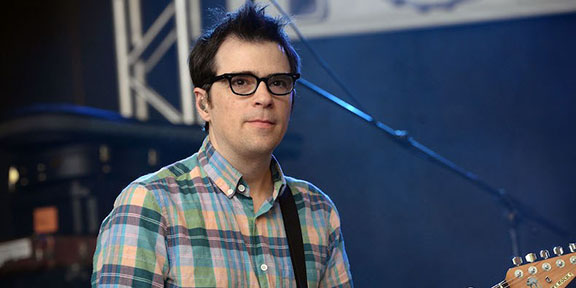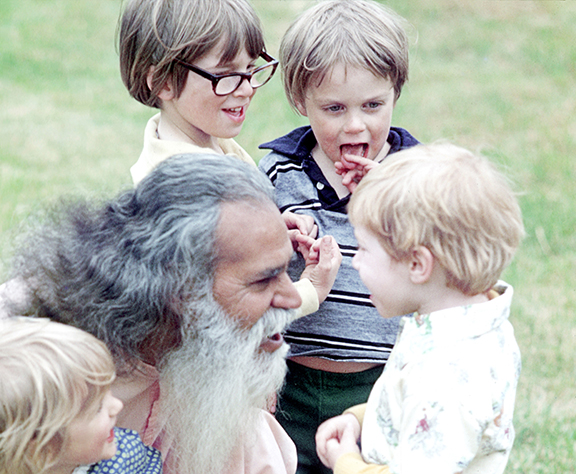 In this interview, Rivers Cuomo, the popular frontman for the wildly successful band Weezer, talks about growing up and going to school at Yogaville East, discovering that there can be creativity without angst, and shares the meditation technique that has enriched his music and his life.
In this interview, Rivers Cuomo, the popular frontman for the wildly successful band Weezer, talks about growing up and going to school at Yogaville East, discovering that there can be creativity without angst, and shares the meditation technique that has enriched his music and his life.
Integral Yoga Magazine: Your parents and your step-father were Zen practitioners, your mom also practiced Yoga, and you grew up in a Yoga ashram. How did that influence you?
Rivers Cuomo: My mom met my dad at the Rochester Zen Center and they also met my step-father, Steve there. I was born into this culture. From the time I was aged four or five, my family was associated with the Ashram. I went to the Yogaville school for three years. After we left in 1981, my parents got back into Zen. That was the world I lived in and I didn’t know any other, so it was an all-pervasive influence.
IYM: What was the Yogaville school experience like for you?

Photo: Swami Satchidananda with ashram school children (Rivers wearing glasses, Leaves next to Rivers).
RC: I definitely remember feeling that Swamiji (as we called him then) was unlike any other person I had ever met. Being in the presence of an enlightened being was special. I always felt safe and peaceful whenever he was around. My brother and I look back on our school experience with so much gratitude. We were so happy we had the opportunity as kids to live in such a positive and supportive environment–one that stressed morality and spiritual discipline. Sometimes, as kids, it wasn’t what we wanted, but as adults we feel we gained tremendous benefits from growing up in that environment.
IYM: Do you stay in touch with any of your classmates?
RC: When I tour, I sometimes see some of them. We exchange emails with some too. My brother and I feel a real bond with the other kids at the school. We share something really deep and meaningful and as we get older, we start to reach out to each other even more. I also have been in touch with the teachers—Satya and Sadasiva (Greenstone) and Swami Sarvaananda. I feel so much gratitude within me when I look back at how much care they put into raising us. I remember so many mornings, going out in the freezing cold and Sadasiva throwing the football over and over again with me. We had so much fun. I am so grateful and I hope other kids can experience that kind of nurturing.
IYM: Many of the Yogaville kids, including yourself, have gone on to very successful careers in the performing arts. Liev Schreiber (Tony-award winning actor), Stefan Lessard (Dave Matthews Band), Gopal Metro (Bella Morte co-founder)—just to name a few. Have you ever wondered about that?
RC: Yes, I’ve noticed that and wondered about it. I think there are two factors. The Ashram attracted parents who were creative and interesting and so they would have kids with those inclinations. And, the Ashram itself was so nurturing and creative. I just remember being in school and feeling that if I had any crazy idea, we would be encouraged to try it out. You want to build a space ship? Sure, let’s try and build it. That’s how we were encouraged to learn.
IYM: Do you think there is a link between spirituality and music?
RC: I think a real connection exists between the spiritual work I have done since my time at the Ashram and the music I make and appreciate. I think it’s one of the things that made my music as successful as it’s been. I think people hear in my music some of the spirituality that I am surrounded by and working on. I think it does comes through in the music. And, people need to connect to that. In Weezer’s first two albums, there is a very beautiful sense of longing and sensitivity that I think was only made possible by growing up in a pretty strict moral environment with meditation and not a lot of self- indulgence. I think you retain a lot of sweetness and beauty in that environment and it comes out in the music.
Then, I was overcome by the fear of being unable to follow up my early success. I was totally shut off from any spiritual practices at that time and made two albums that weren’t as beautiful. And, at one point, I was looking for ways to stimulate my creativity but I wasn’t really looking into myself—I think you hear the lack of spiritual practice in those albums. Then I got into spiritual practice again and made our next album and I think you can hear increased sensitivity and you can hear my concentration in the lyrics—I was finding the right words and the right feeling in my voice.
IYM: So many artists’ creativity seems to thrive with angst! Did you worry about becoming too peaceful?
RC: Yes, I think I did have a fear of that, and it kept me from meditation. Then, my producer, Rick Rubin, suggested I try meditation. I told him I needed my angst, otherwise I wouldn’t have anything to write about. But, even with the angst, I was still choked up creatively! So, I tried meditation and instantly I felt things loosen up.
IYM: You have a steady Buddhist practice now. Would you tell us about that?
RC: My Vipassana meditation teacher, S. N. Goenka, has a lot in common with Swami Satchidananda. Mr. Goenka wants to break down the barriers between religion and make these practices available to all. He says it is not Buddhist meditation. It was taught by Buddha but it isn’t “Buddhist.” His programs are attended by people of all religions or no religion. There is no Buddha idol or any paraphernalia around the meditation center. There is so much that the different traditions have in common and that is the essential part of them. People like to divide into factions and have arguments but they have to get over it.
This Vipassana technique is very different from Zen and much closer to what we learned in the Ashram. I had some advantages when I started as I had done so much of this practice in the Ashram at such a young age. Daily, in the Ashram school, we did deep relaxation, where you systematically observe what is going on in your body. As it turns out, Vipassana is similar. We are in a sitting position, observing the sensations from the feet to the top of the head and doing this over and over again. The focus is also on “seeing things as they are.” We learn to observe things as they are, not as we would like them to be. In our practice it means observing physical sensations on the level of your body—pleasant or unpleasant—with as much equanimity as you can manage. By doing this over and over, you can slowly train your mind to release itself from craving and aversion, so you can be happy all the time under any circumstances.
IYM: What does your practice consist of?
RC: Our daily sittings are an hour in the morning and an hour in the evening. It’s also recommended that you go to a 10-day intensive once a year. I have a freer schedule and have so much enthusiasm that I go more—probably once every couple of months. Last year I did a 20-day course and this year 30-day. All day long we sit in silence.
IYM: How do you move between the music world and the spiritual world?
RC: At first everyone was afraid about the influence my spiritual practice might have on the band or if I would turn into a monk. I don’t feel any urge to change my style drastically. Had I been a carpenter, I would still do the same carpentry—I wouldn’t suddenly start building pagodas! But, I did have a lot of questions about the rock world and my practice. How was this going to go down? But, it turned out that all my fears were unfounded. I discovered that, because of my spiritual practice, I was actually more comfortable on stage, doing interviews, touring. I could bring the meditation technique with me—into my daily life and on stage. I can keep it with me. I can observe my sensations and when I do so, my mind calms down, I get a balanced mind, and I can do better. The technique helps me wherever I go. The meditation helps me dig deeper into myself and do a better job.
Over the past year we have been working so hard, I think my band-mates have all been relieved and happy for me, as they see that I’m happier and easier to work with. I used to be a control freak or I would totally withdraw and not give any input. I am a much easier collaborator now. And, now they are interested in meditation too. Before we go onstage we all spend five or ten minutes observing our breath.
IYM: Any closing thoughts on your hopes and dreams for the future?
RC: I want to continue to work on becoming a happier and more peaceful person and continue serving all beings however I can. I ‘m not always sure what that means, but whatever my destiny is, I look forward to meeting it and serving as best I can.
I’d also like to once again express my gratitude to Swami Satchidananda, all my teachers, and all the others at the Ashram, for giving me such a great start in life. I couldn’t have asked for a better environment to grow up in.
About Rivers Cuomo:
Rivers Cuomo is a musician, best known as the lead singer, lead guitarist, and principal songwriter of the alternative rock band Weezer. In addition to fronting Weezer, Cuomo has also worked as a solo artist and a writer and featured artist on other artists’ records. For more information about Rivers Cuomo please visit: www.riverscuomo.com. For more information about the teaching of S. N. Goenka, please visit: www.dhamma.org.

